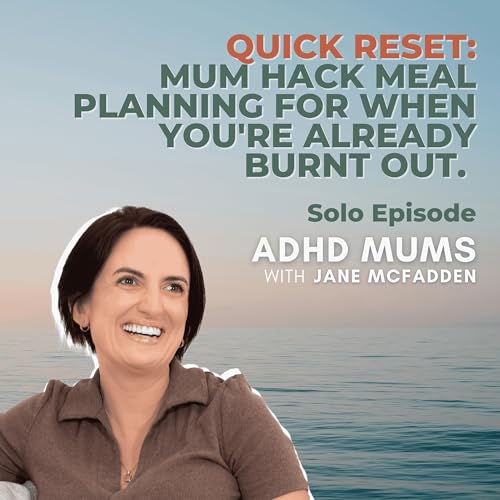
43. QUICK RESET: Mum hack meal planning for when you're already burnt out.
Failed to add items
Add to basket failed.
Add to Wish List failed.
Remove from Wish List failed.
Follow podcast failed
Unfollow podcast failed
-
Narrated by:
-
By:
About this listen
Meal planning was built for neurotypicals. That’s why it breaks ADHD mums.
In this Quick Reset, Jane calls out the shame trap of “just get organised” and explains why meal planning feels impossible when it demands six executive functions at once. From frozen meat to kids refusing everything you bought, this episode offers ADHD-friendly hacks for surviving dinner when you’re already on the edge .
What We Cover in This Episode- Why meal planning is an executive function overload, not laziness
- The invisible cost: six domains firing at once — predict, remember, plan, shop, cook, clean
- Why “future you” can’t be trusted to follow perfect systems
- How to design a “burnout menu” for your worst days
- Theme nights, breakfast-for-dinner, and recurring online orders as ADHD-friendly tools
- Why bubble baths don’t fix brain fog — but survival food does
This Episode Is For You If…
- You hate meal planning, cooking, or even thinking about food
- You keep forgetting key ingredients or end up with “nothing to cook” after shopping
- Your kids’ picky eating, ARFID, or sensory issues make one-meal-fits-all impossible
- You feel guilty for not sticking to meal plans
- You want hacks that actually work on burnout days, not Pinterest fantasy boards
Claim: “Meal planning reduces executive function load, supports emotional regulation, and creates predictability for ADHD households — especially when meals are visually structured, repetitive, and simplified.”
🔍 Research & References for Show Notes:Executive Function and Planning Impairments in ADHD
- Barkley, R. A., & Murphy, K. R. (2006). Attention-Deficit Hyperactivity Disorder: A Clinical Workbook (3rd ed.).
- Highlights impairments in planning, organisation, and future thinking in ADHD adults and families. Recommends routines and external structures for managing daily demands.
Decision Fatigue and ADHD
- Baumeister, R. F., et al. (2008). Ego Depletion: Is the Active Self a Limited Resource? Journal of Consumer Research, 36(4), 543–556.
- Explains how repeated decision-making (like “What’s for dinner?”) leads to emotional exhaustion and poor impulse control — especially in people with existing cognitive load issues.
Routine and Predictability Reduce Stress
- Pelham, W. E., Fabiano, G. A. (2008). Evidence-Based Psychosocial Treatments for Attention-Deficit/Hyperactivity Disorder. Journal of Clinical Child & Adolescent Psychology, 37(1), 184–214.
- Shows that structured routines like planned meals and consistent eating times reduce behavioural stress in ADHD children.
Visual and Repetitive Meal Systems Help ADHD Households
- Tuckman, A. R. (2009). More Attention, Less Deficit: Success Strategies for Adults with ADHD.
- Recommends simplifying meals, using visual lists or repeating favourite foods to limit overwhelm and improve follow-through in ADHD adults.
Link Between Blood Sugar Stability, Nutrition, and Emotional Regulation
- Benton, D., & Donohoe, R. T. (1999). The Effects of Nutrients on Mood. Public Health...


